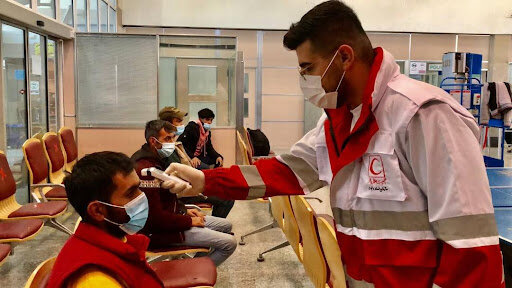IRCS expands activity in border areas to contain Omicron

TEHRAN – The Iranian Red Crescent Society (IRCS) has enhanced its presence on the land, air, and sea borders to detect infected passengers and quarantine those with Omicron symptoms, IRIB reported on Saturday.
Passengers entering Iran must have a certificate of two doses of the vaccine, a negative test valid for 48 to 72 hours from the date of notification. In case of any symptoms or test positive, they will be quarantined for 14 days at personal expense.
The IRCS has been active in the field of vaccination and has so far imported over 12 million doses of coronavirus vaccine to the country.
Since March 10, 2021, the IRCS with the cooperation of ministries of health and transport, is implementing a plan with the goal of rapidly identifying and testing incoming passengers and keeping them in quarantine facilities, if necessary; in order to prevent the spread of new strains.
A total of 471 members of the IRCS cooperate for carrying out the plan in 16 provinces across the country.
Thirty border checkpoints have been selected, including 18 land borders, nine air borders, and three sea borders, all incoming passengers will be tested and referred to the quarantine facilities in case of necessity.
Omicron and banned flights
On August 22, 2021, Iran announced that all travelers must have a negative PCR test certificate or a health card to enter the country during the Covid-19 pandemic, IRINN reported.
By the emergence of the highly contagious Omicron variant, countries are adopting new regulations to prevent the transmission of the variant, so that Iran’s National Headquarters for Coronavirus Control on November 27 banned arrivals from the African countries.
So far, 43 cases of omicrons have been identified in the country and Tehran recorded the highest number of infections.
There are no direct flights from Iran to South Africa and travelers are not allowed to enter Iran, Iranians who want to travel must also be quarantined at the border to have two negative PCR tests.
Foreign tourists must buy coronavirus insurance from authorized companies when entering the country, and if they suffer from the pandemic in Iran, they will be provided with a place and treatment for 14 days.
Inbound passengers must have coronavirus insurance, which differs from the routine insurance coverage purchased by all tourists before the coronavirus era.
On December 25, 2021, Health Minister Bahram Einollahi said that the rapid spread of Omicron may pose serious threats to the country although he insisted that authorities had identified few cases infected with the variant.
Einollahi said that Iran has two “golden weeks” to expand booster vaccination coverage to more people in order to prevent a potential explosion in the number of infections with Omicron in early January.
FB/MG
